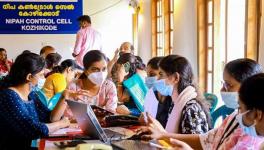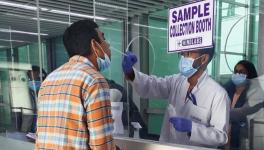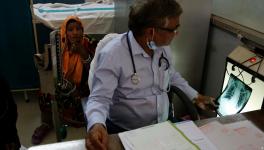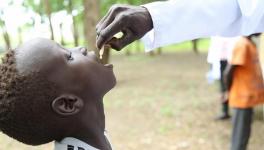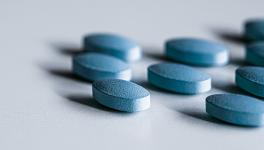COVID-19 Disruptions Can Lead to Over 500,000 Extra HIV-related Deaths in Sub-Saharan Africa: Report
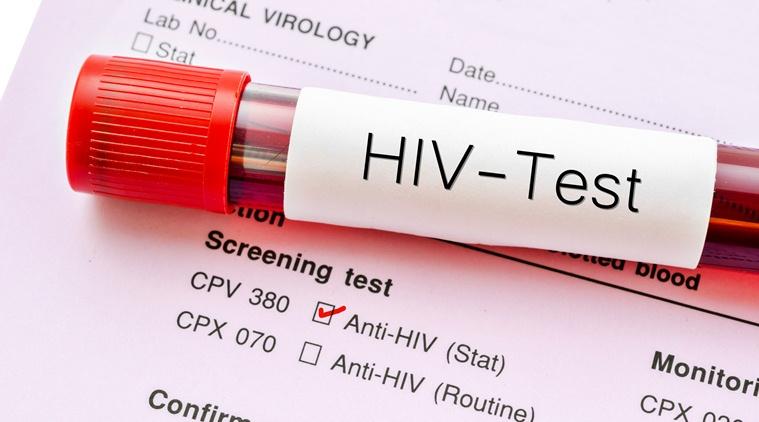
Representational image. | Image Courtesy: Indian Express
More than 500,000 extra deaths can be caused by AIDS-related diseases, including tuberculosis in sub-Saharan Africa in 2020-21, due to the six-month disruption of anti-retroviral therapy during the COVID-19 pandemic, a joint report of WHO and UNAIDS has estimated. The report, released on May 11, was prepared on the basis of a modelling group convened by the World Health Organisation and UNAIDS.
According to the report, if immediate action is not taken then the impact of disruption “could effectively set the clock on AIDS-related deaths back to 2008, when more than 9,50,000 AIDS-related deaths were observed in the region.” The report added that the people would continue to die from the disruption in large numbers for at least another five years, with an annual average excess in deaths of 40% over the next half a decade.
Referring to every death as a “tragedy”, Winnie Byanyima, executive director of UNAIDS, urged the governments to “ensure that every man, women and child living with HIV gets regular supplies of antiretroviral therapy—something that’s literally a life-saver.”
An estimated 25.7 million people in sub-Saharan Africa were living with HIV and 16.4 million (64%) were taking anti-retroviral therapy in 2018. However, disruptions in supply chains or services being overwhelmed because of competing need to support COVID-19 response have now put all those people at risk of having their treatment interrupted.
Commenting on the situation, Dr Tedros Adhanom Ghebreyesus, Director-General of the WHO, reportedly said, “We must read this as a wake-up call to countries to identify ways to sustain all vital health services. For HIV, some countries are already taking important steps, for example ensuring that people can collect bulk packs of treatment, and other essential commodities, including self-testing kits, from drop-off points, which relieves pressure on health services and the health workforce. We must also ensure that global supplies of tests and treatments continue to flow to the countries that need them.
Highlighting the fact that right to health emphasises that one disease cannot be fought on the expense of another, Byanyima said that, “The COVID-19 pandemic must not be an excuse to divert investment from HIV.”
Anti-retroviral therapy helps an HIV positive person by reducing the viral load to an undetectable level which keeps the affected person healthy and also prevents onward transmission of the virus. But, any break in this therapy can seriously impact the affecte person’s health, which can ultimately lead to death. “Even relatively short-term interruptions to treatment can have a significant negative impact on a person’s health and potential to transmit HIV,” the report said.
The research is based on five modellers brought together using different mathematical models to analyse the effects of various possible disruptions to HIV testing, prevention and treatment services caused by COVID-19. The models analysed the potential impact of disruptions between three and six months on AIDS mortality and HIV incidence in the region. The report says that, “in the six-month disruption scenario, estimates of excess AIDS-related deaths in one year ranged from 471 000 to 673 000, making it inevitable that the world will miss the global 2020 target of fewer than 500 000 AIDS-related deaths worldwide.”
Further, “shorter disruptions of three months would see a reduced but still significant impact on HIV deaths. More sporadic interruptions of anti-retroviral therapy supply would lead to sporadic adherence to treatment, leading to the spread of HIV drug resistance, with long-term consequences for future treatment success in the region.”
There can also be a significantly adverse effect on the gains made in preventing mother-to-child transmission of HIV, with the report stating that the numbers of new child HIV infections could rise drastically, by as much as 37% in Mozambique, 78% in Malawi, 78% in Zimbabwe and 104% in Uganda. This could lead to a reversal of the 43% decline, from 250,000 in 2010 to 140,000 in 2018, of new HIV infections among children, it said.
The COVID-19 pandemic can also lead to reduced quality clinical care as health facilities become overstretched and viral load testing is suspended. It can also lead to reduced adherence counselling and drug regimen switches. As per the report, these could lead to additional mortality caused by AIDS in sub-Saharan Africa.
In order to avert the excess HIV-related deaths and to prevent increases in HIV incidence during the COVID-19 pandemic, the report, therefore, suggests that it is important for countries to “prioritise shoring up supply chains and ensuring that people already on treatment are able to stay on treatment, including by adopting or reinforcing policies such as multi-month dispensing of anti-retroviral therapy in order to reduce requirements to access health-care facilities for routine maintenance, reducing the burden on overwhelmed health-care systems”.
Get the latest reports & analysis with people's perspective on Protests, movements & deep analytical videos, discussions of the current affairs in your Telegram app. Subscribe to NewsClick's Telegram channel & get Real-Time updates on stories, as they get published on our website.











